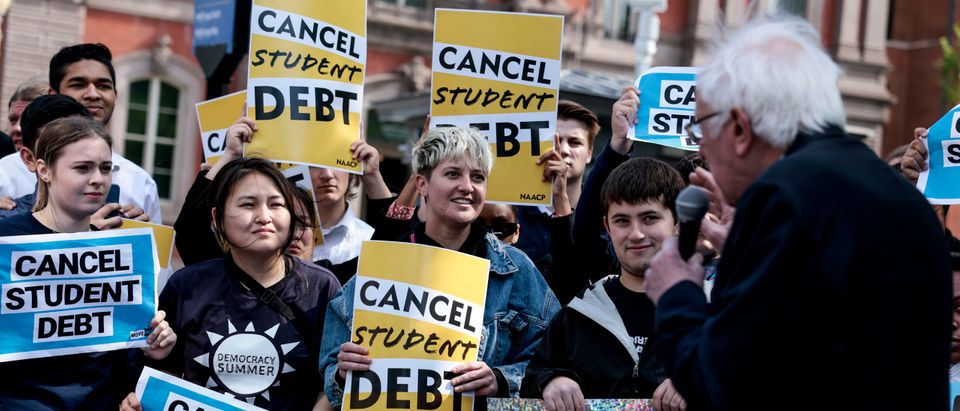The legendary journalist H.L. Mencken once observed, “Every election is a sort of advance auction sale of stolen goods.”
Mencken’s cynical take shows how well he understood the spoils system of modern politics, which involves politicians promising to return the wealth they take from the people in exchange for votes.
The key to this crude process is to not make the “honest graft”—a term coined by Tammany Hall rascal George Washington Plunkitt—too obvious. Or at least it was.
With his executive order to wipe out nearly half a trillion dollars of student loans with the stroke of a pen—debts that will ultimately be shouldered by taxpayers—President Joe Biden made it clear that such discretion is no longer necessary.
Biden didn’t just announce a plan to wipe out as much as $20,000 in debt for borrowers without so much as a congressional hearing. He waited two years to announce his loan forgiveness plan, and then unveiled it six weeks before Election Night.
Even those cynical of Biden’s policy were impressed with the results of the strategy.
“I thought student debt relief was bad policy and bad politics. I still think it bad policy – but looking at the youth vote surge, hard to deny its political impact,” observed.The Atlantic’s David Frum, an outspoken Never Trumper.
Populist progressives expressed surprise that it took folks like Frum so long to see the political power of using the federal treasury to purchase loyalty in this manner, and evidence suggests the populists are not wrong in their calculus.
While few doubt that student loan forgiveness is bad policy—the Washington Post editorial board, which endorsed Biden in 2020, called it “an expensive, regressive mistake”—there’s evidence that Biden’s debt forgiveness scheme worked.
While midterm exit polls showed Democrats lost substantial ground with women and people of color, they crushed the young people vote. A Tufts University election initiative found young voters (18-29) turned out en masse and overwhelmingly voted for Democrats (+28).
In other words, it’s quite likely that dangling tens of thousands of dollars of student debt relief in front of young voters had its intended effect.
Unfortunately for forgiveness enthusiasts, they may never get their payoff.
Following Election Tuesday, a federal appellate court issued an injunction preventing the loan forgiveness program from moving forward. On Thursday the Supreme Court upheld that injunction and agreed to hear oral arguments in February.
Things don’t look good for student debt relief. Time magazine conceded somewhat glumly that Biden’s order is unlikely to survive a constitutional review.
“That’s a very real risk at the moment,” Michael Sant’Ambrogio, a law professor at Michigan State University, told the magazine, noting that the high court has historically been “kind of skeptical” of sweeping executive actions.
If the executive order is struck down, supporters of loan forgiveness will complain about the Supreme Court’s conservative makeup. But it’s important to remember that judicial review is a feature of the American system, not a bug.
A review of basic civics shows why.
The simple idea of the separation of powers we all learn about in grade school was designed for a specific purpose: to limit the concentration of power. This is why federal power was separated into three distinct branches of government. The founders understood that even though the federal government’s clearly enumerated powers were “few and defined,” in the words of James Madison, over time its limitations could erode.
That is precisely what has happened. The federal government today is involved in nearly every aspect of our lives, and auctioning off stolen goods has become the primary purpose of Washington, DC.
After all, it is not just students underwater in loans seeking relief. Everyone seems to have a hand out. Private corporations lobby with great success, receiving billions of dollars in subsidies. Universities receive an astounding amount of largesse. And then there are the masses: “stymie checks” proved an absolute hit with voters. Recent polling shows nearly two thirds of Americans support sending out another batch of “stimulus” checks to fight inflation.
America has embraced what the great 19th century economist Bastiat called “the great fiction,” a system in which “everybody endeavors to live at the expense of everybody else.”
This is working out exactly as one would expect. The US government is $31 trillion in debt and the Federal Reserve’s money printing has caused an inflation crisis.
This economic madness might have been what John Adams was getting at when he noted that raw democracy “never lasts long. It soon wastes, exhausts, and murders itself.”
Fortunately, the Founders did not create a raw democracy. They created a constitutional republic with checks and balances, and Biden’s student loan scheme is unlikely to survive.
For this we should be grateful. The problem with socialism, as Margaret Thatcher once observed, is that “you eventually run out of other people’s money.” Maybe it’s time to give individualism another try.
Jonathan Miltimore (@Miltimore79) is managing editor of the Foundation for Economic Education. An alumni of the Institute for Humane Studies journalism program, he formerly was a reporter for the Panama City News Herald, senior editor of the History Channel magazine, and served in the speechwriting department for President George W. Bush.
The views and opinions expressed in this commentary are those of the author and do not reflect the official position of the Daily Caller.


